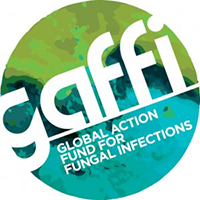Millions Deprived of Life Saving Antifungal Medicines
A new report published today in the esteemed Journal of Antimicrobial Chemotherapy, documents how many countries do not have life-saving antifungal therapies.
We have known for over 25 years that many people with AIDS and cancer do die of fungal complications. Why on earth are commonly used antifungal medicines not provided to everyone who needs them?”
GENEVA, SWITZERLAND, August 11, 2016 /EINPresswire.com/ -- The world is in the grip of a global crisis that kills the equivalent of the populations of Philadelphia, Kampala or Prague - around 1.6 million each year. A new report published today in the esteemed Journal of Antimicrobial Chemotherapy, documents how many countries do not have life-saving antifungal therapies. — Rupert Everett
Fungal infections attack the lungs and may spread through the body and, without the drugs to fight back, claim the lives of over 3,500 people every day.
Now GAFFI (The Global Action Fund for Fungal Infections) has gathered together the most powerful weapon there is – knowledge – information that it plans to use to bring about change.
It has today* published the largest survey ever undertaken from 159 countries and found that a pair of critical antifungal medicines for AIDS patients are not available in over 95 countries. One of these antifungals has been available since the 1950’s and the other since the 1970’s.
Professor David Denning of The University of Manchester, President of GAFFI and the paper’s lead author says it beggars belief that hundreds of millions of people cannot access the optimal therapy for fungal meningitis and fungal lung infections. “It is doubly tragic,” he says, “that these antifungals have been used since the late 1950’s in the case of amphotericin B. Yet the systems for delivering these drugs to the most needy are still not in place. “Last year GAFFI called on governments to provide fungal diagnostics and antifungal drugs to all their citizens yet there has been a deafening silence. There is clearly a long way to go, but the tragedy is that every day thousands more people die needlessly while the world turns a blind eye,” he adds.
Hollywood actor and GAFFI celebrity patron Rupert Everett declared that: ‘We have known for over 25 years that many people with AIDS and cancer do die of fungal complications. And death is avoidable with treatment. Why on earth are commonly used antifungal medicines not provided to everyone who needs them?”
Dr Glenda Gray, President and CEO of the African Medical Research Council and Professor of Pediatrics, Faculty of Health Sciences, at University of Witwatersrand, says: “In South Africa we are addressing the HIV epidemic squarely on with greatly increased provision of anti-retroviral drugs and expanding testing. “Fungal diseases in AIDS have not received the priority they should have, although this is now changing with our national screening program for Cryptococci meningitis. Clearly ensuring antifungal agents are available to all is an key component in reducing deaths and illness across southern Africa."
GAFFI’s key findings:
• One of the critical drugs for fungal meningitis in AIDS (amphotericin B) is not available in 42 countries. The other key drug for fungal meningitis, flucytosine, is unavailable in at least 95 countries. Yet both have been available in Europe and the US for over 40 years. The World Health Organization recommends they be used together to bring down mortality from 100% to 25%. Fungal meningitis is the commonest form of meningitis in sub-Saharan Africa because of AIDS.
• The 25 -year old drug, fluconazole is available in all countries and itraconazole is unavailable in just five countries. However, being available is not enough – price also matters as patients pay for their care in many countries. The daily cost of fluconazole varied from <$1 to $31 and itraconazole from <$1 to $102. In South Africa, which has the largest AIDS burden in the world and a massive TB problem, itraconazole costs about £11.60 per day – unaffordable for most people there.
*Kneale M, Bartholomew JS, Davies E, Denning DW. Global Access to Antifungal Therapy and its Variable Cost. J Antimicrob Chemother. In press.
For more information please contact Susan Osborne, Director of Communications, Goodwork, on 07836 229208 or email susan.o@thisisgoodwork.org
Notes to Editors
Globally, over 300 million people of all ages suffer from serious fungal infections every year resulting in over 1,500,000 deaths. Like malaria with 438,000 deaths and tuberculosis with 1,500,000 deaths annually (2014), many deaths from fungal infection are avoidable. Most serious fungal infections are ‘hidden’, occurring as a consequence of other health problems such as asthma, cancer, organ transplant, AIDS and corticosteroid therapies. All require specialized testing for diagnosis, and delays or missed diagnosis often lead to death, serious chronic illness or blindness. While antiretroviral therapy of HIV infection is essential, many patient die of fungal disease before antiretroviral treatment, or in the first year of therapy.
Fungal meningitis is usually caused by Cryptococcus neoformans so called cryptococcal meningitis. There are thought to be around 300,000 patients affected each year. It is easy to diagnose with a simple blood test that takes 10 minutes, and costs about £3 or $4.
Fungal lung infections include aspergillosis and histoplasmosis that respond to itraconazole.
GAFFI is a registered International Foundation based in Geneva and is focused on 4 major tasks related to serious fungal infections. These are:
• Universal access to diagnostics for serious fungal disease
• Universal access to antifungal agents http://www.gaffi.org/antifungal-drug-maps/
• Accurate data on the number and severity of fungal infections
• Health professional education related to better recognition and care for patients with serious fungal disease
GAFFI issued its 10 year Roadmap ’95-95 by 2025’ in 2015 calling on all governments and international health agencies to ensure 95% of the global population have access to fungal diagnostics and antifungal therapies by 2025: http://www.gaffi.org/roadmap/
GAFFI is actively fundraising to develop a team to correct this ‘market failure’.
Susan Osborne
Goodwork, Director of Communications
+44 (0)208 747 1488
email us here
Legal Disclaimer:
EIN Presswire provides this news content "as is" without warranty of any kind. We do not accept any responsibility or liability for the accuracy, content, images, videos, licenses, completeness, legality, or reliability of the information contained in this article. If you have any complaints or copyright issues related to this article, kindly contact the author above.



